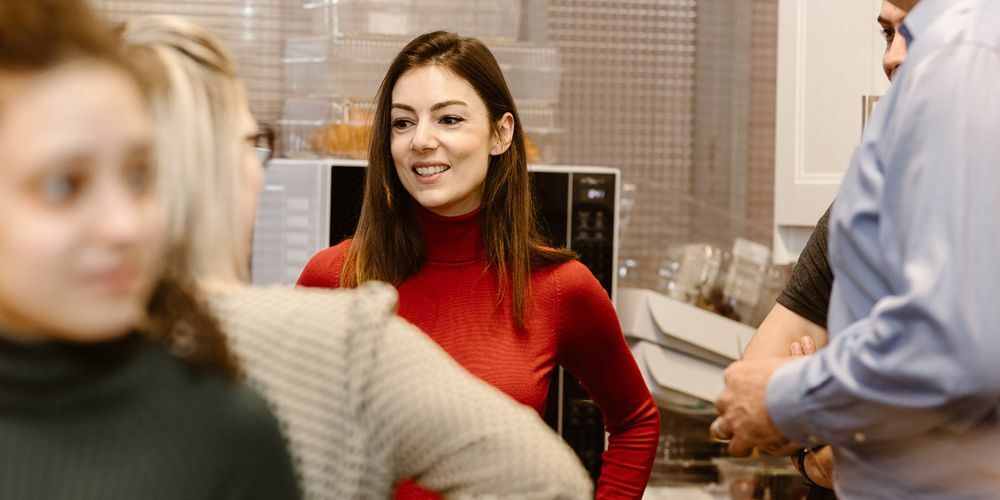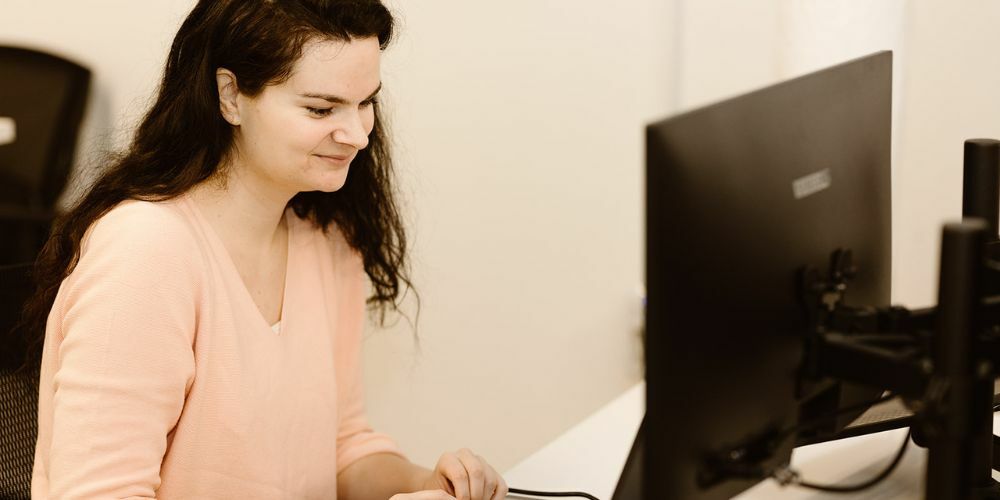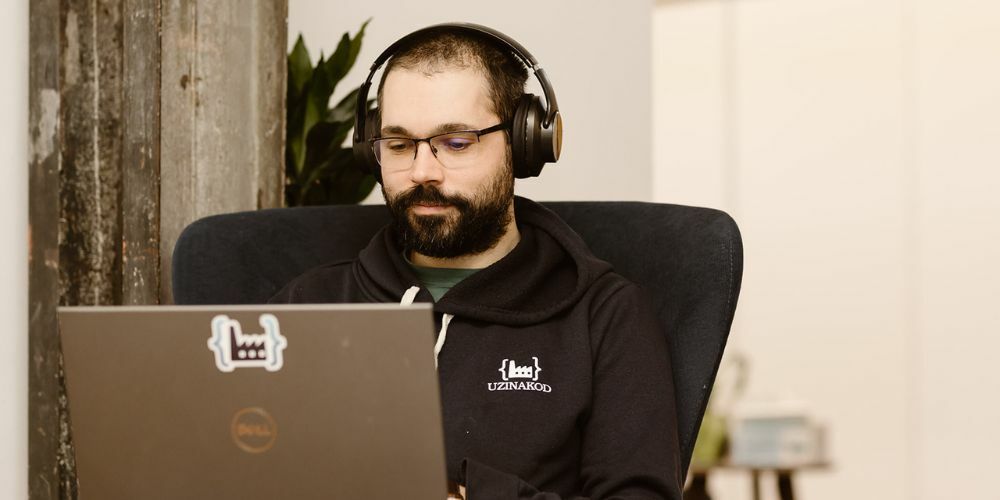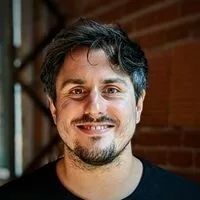Crossing the Atlantic is not what it used to be. All you need to do is find a flight, have your passport and some luggage in hand, and you’re set.
But what about when the trip is one-way and for the long term? Is it as easy as planning a few days’ getaway? Not quite!
Between the administrative procedures, the change of job, the change of lodging and the distance from one’s family, an experience rich in emotions awaits the candidates. That’s the least we can say.
Is it worth it? We asked five of our employees who left France and are now in Quebec.
Here are their stories!
What motivated you to try the international experience?

Katia Bertagnin, Project Management Lead
It’s something that my husband and I had in mind for a long time. We let our thoughts mature, knowing that if we tried to immigrate internationally, it would be for a permanent settlement.
We compared several countries that interested us on different criteria: politics, access to employment, growth possibilities… we chose Canada, because it was the country that most corresponded to our life project.

Mathieu Licheron, Quality Expert
I had been thinking of Canada for a very long time, since I was a student, in fact. Several of my friends over the last few years have made the jump to Canada, so I already had some acquaintances here. Their positive feedback reassured us. It happened quite quickly afterwards.

Sophie Gonzalez, Artificial Intelligence Designer
This was not my first expatriation, as I previously lived in Belgium and Singapore. I wanted to change countries. Why Canada? Because I was looking for a place where I could pursue a career, where there would be interesting opportunities, and where I would have a good standard of living.
What were your biggest worries when you took the leap?

Thibaut Biscay, Full-Stack Developer
For me, it was mostly the administrative part! I had my sister already in Montreal, so for the integration, it was not a problem.

In a way, it’s having to start your whole life over again abroad, to rebuild a social circle, to find your bearings, especially when you’re going alone. You also have to get used to the local cuisine!

I think this is the case for many expatriates: the family aspect. We have two children, so it’s the fear of being isolated, without friends or family members nearby. On the other hand, being in Canada now, we offer them a living environment where they can better blossom.

We couldn’t do the scouting we wanted to do because of the pandemic. So, when we finally got on the ground, it was the first time in our lives that we had been in Canada. It was a bit scary.
The other fear was how to adapt to our new lives. We made the trip as a family with our daughter and our cat. It’s a lot to organize, and everyone has to be able to adapt individually.
What was your first contact with Uzinakod?

Constance Moreau, Business Analyst
I had seen the information at the Journées Québec France that Uzinakod was recruiting. I was able to meet Audrey (Analysis) and Gabrielle (Human Resources) in an interview afterwards.

My spouse found a job first, but I felt much more comfortable arriving with my own job lined up. So I applied for several jobs through the Journées Québec France. That’s where I had my first contact with Uzinakod in April 2021, before arriving later in September.

I went through the Journées Québec France and my first contact was Érika (Human Resources). She really helped me in that respect. When I arrived, I was put in contact with Katia and other expats who had just arrived. This helped a lot to make my arrival go well by sharing their feedback.

I had already arrived in Canada with a WHP and a job offer. The one that Uzinakod offered on LinkedIn caught my attention and spoke to me a lot for the multi-project aspect, the implementation of quality practices and the autonomy that I would benefit from.
I had other offers on the table, but I contacted Uzinakod again, because I had a very good feeling with Sarah (Human Resources), Joanna (Project Office), and Audrey (Analysis).

How did the immigration process go?

With Uzinakod, it was a follow-up, a presence to make sure that everything was going well. It’s important in this type of international procedure to feel that you have people behind you if you need them.
I was quickly put in touch with Joanna, who had a similar immigration profile to mine. She was able to share a lot of information and advice with me, as well as support. You feel like you’re a part of the team before you arrive, which is an added comfort.

Uzinakod was there from beginning to end. Gabrielle gave me a lot of guidance, even though I was very knowledgeable since it was already a long-term project. For every question or concern, I was able to communicate with her directly to get reassurance or confirmation of my assumptions. I was guided step by step.

Being in-between statuses, there was a risk that I would be without a work permit for a short period of time. With Sarah, we applied for the A75 associate permit with Uzinakod. She did all the paperwork on the immigration side and simply transferred the documents to me to complete my application. I also had a meeting with Master Qiu Di Guo to discuss the specifics of our situation.

The team of lawyers assigned to me completed my case in no time. The follow-ups were constant on their part. When I had to go to the border to complete the process (on a Saturday), I was able to get Sébastien (Cofounder) and Érika on the phone and they resolved some concerns within 15 minutes. I was really impressed at that point!

How did you manage to find your first home here?

I got a lot of advice from colleagues about neighborhoods, and used tools like Marketplace. I discovered that Quebecers mainly move on July 1st. When I arrived in October, there was not much choice! I was also very surprised to find that fully-furnished rentals are quite rare in Montreal. This was not something that I had expected!

I never take an apartment from a distance! With my partner at the time, we took an Airbnb on a very short-term basis. Then we were renting while making the tour of the housing offers that were available outside the standard period.
We checked out a few neighborhoods that interested us and we knew which one we wanted to avoid at all costs: the Plateau Mont-Royal. We didn’t want to feed that cliché!

It was indirectly by a French Instagrammer, who said she found her condo in Quebec through a real estate broker. The daughter of my former boss, who now lives in Montreal, went to visit with the broker. This allowed us to compare two apartments that we had found. We were able to make a more informed choice, despite the distance.

We first found a temporary apartment for two months that was rented by a French couple who were returning home for the summer. We had found it ourselves via the classified ads platform Kijiji, just like the two others that followed.

Our family situation meant that we didn’t want to arrive in a temporary accommodation. By a combination of circumstances, I quickly had a daycare spot for my daughter. So, we were able to find neighborhoods that made it easy to drop her off on our way to work. The visits were made for us by videoconference thanks to a broker. The fact that she was on-site reassured the owners and added a lot of seriousness to our approach.
What do you like most about your new life in Montreal?

What I like most is the comfort. Compared to Paris where the housing is very expensive and very small, I live my life with the “American dream:” condo with heated indoor pool and pool room. I dreamed about it and it is absolutely inaccessible in France.

What was most striking for us was the quality of human relations. The mentality is completely different. Everyone is benevolent, helpful. There is a lot of civic-mindedness!
There is also security, the care of children at school and even pre-school. At the work level, the mindset is more focused on meritocracy.

It’s really a feeling, but it’s calmer in general. In Île-de-France, it was a race all the time: transportation, stress, homework… you don’t realize it, but you’re in a constant sprint. Now that we are here, we realize that we have time, that we are both close to work, that the kids can play in the park with their friends…
Also, one thing that changes a lot when you arrive in Montreal is the use of more familiar greetings. It breaks a barrier directly. It may seem strange at first, but it changes the way you look at the day.

In Montreal, you have the advantages of an international city without necessarily having the disadvantages. You don’t have the feeling of being smothered by buildings, even when you’re in the heart of downtown. With parks everywhere, it’s a very large city where you can breathe easily.

Do you think you’ll stay in Quebec long-term?

For now, we want to at least get our citizenship. Our application for permanent residency is already in process, so we see ourselves here for several more years.

For now, I plan to stay here. I just need to motivate myself to face the paperwork for permanent residency!

If we took this step to buy in Quebec (in Lévis), it’s to provide ourselves and our daughter with stability. It’s for the long term!

At some point, I would like to settle down in a country for good. I’m waiting until I’ve completed a year before seeing if I want to stay permanently, to have a better sense. For the moment, it’s very positive. I survived the winter, which I was afraid of!
Conclusion
The adventure seems to please our new comrades. As Constance said, if she had to do it all over again, she would not have waited so long before taking the plunge, despite the challenge it represents.
For Uzinakod, being able to count on talent from the four corners of the world, while showcasing its Quebec roots, is a real source of pride.
Accompanying our future colleagues in the immigration process and putting them in touch with expert lawyers in the field is a matter of course. And it is with pleasure that we will continue this trend, not only if you’re French!
You too, want to realize your North American dream? Let us know how we can help you.




